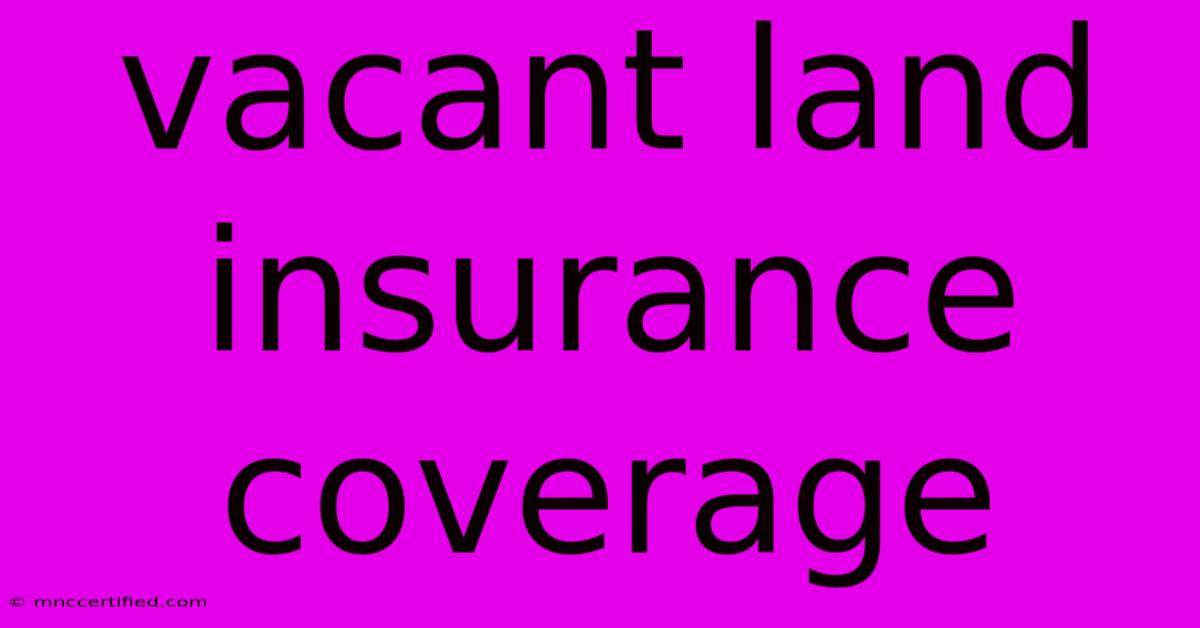Vacant Land Insurance Coverage

Table of Contents
Vacant Land Insurance Coverage: Protecting Your Investment
Owning vacant land presents unique challenges, and protecting your investment requires a specialized insurance policy. Unlike a homeowner's or renter's insurance policy, standard coverage doesn't extend to undeveloped properties. This comprehensive guide explores vacant land insurance coverage, its essential components, and why it's crucial for landowners.
Why You Need Vacant Land Insurance
Vacant land, while seemingly inert, faces various risks. These include:
- Liability: Someone could be injured on your property, leading to costly lawsuits. Liability coverage protects you from financial repercussions related to accidents or injuries on your land.
- Vandalism and Theft: Unoccupied land is a tempting target for vandalism, theft of materials (like fencing or landscaping supplies), or even illegal dumping. Property damage coverage safeguards your investment against these threats.
- Natural Disasters: Damage from fire, flooding, windstorms, or other natural disasters can significantly impact the value of your land. Comprehensive coverage ensures protection against these unforeseen events.
- Third-Party Damage: Damage caused by a neighboring property, such as a fallen tree or erosion, can require significant financial resources to repair. Third-party liability coverage is important in these cases.
- Illegal Activities: Your land might become the site of illegal activities like dumping or drug production, incurring clean-up costs and legal fees. This is another crucial reason to invest in adequate insurance.
Key Components of Vacant Land Insurance
A comprehensive vacant land insurance policy typically includes:
- Liability Coverage: This is arguably the most important aspect, protecting you from financial responsibility for injuries or damages suffered by others on your property. The amount of liability coverage should be tailored to your specific risk assessment.
- Property Damage Coverage: This covers damage to structures on the land (even minimal ones like survey markers or fences) and any improvements. This also covers damage caused by vandalism, theft, or malicious mischief.
- Extended Coverage: Many policies offer extensions for specific hazards, such as flood insurance (often purchased separately) or terrorism coverage. Check what additional options your policy offers.
- Specific Perils Coverage: Depending on your location and the risks involved, you might need to include specific perils such as fire, windstorm, or hail in your policy. This ensures protection against the most likely threats to your vacant land.
Choosing the Right Vacant Land Insurance
Selecting the appropriate coverage involves considering several factors:
- Location: Areas prone to natural disasters or high crime rates require more extensive coverage.
- Land Size: Larger properties might need higher coverage limits.
- Intended Use: Plans for future development (such as building a house or commercial structure) will influence the type and level of coverage you need.
- Policy Cost: Compare quotes from multiple insurers to find the best balance between cost and coverage.
Finding the Right Insurer:
Don't hesitate to shop around and compare quotes from multiple insurance providers to secure the best coverage at a competitive price. Many insurance companies specializing in commercial property also offer vacant land insurance. Discuss your specific needs with each provider to ensure the policy aligns perfectly with your situation.
Frequently Asked Questions (FAQs)
Q: How much does vacant land insurance cost?
A: The cost varies depending on factors like location, land size, and coverage level. Contacting multiple insurers for quotes is highly recommended.
Q: Is vacant land insurance mandatory?
A: Vacant land insurance isn't typically mandatory, but it's highly recommended to protect your financial investment. The absence of coverage could leave you vulnerable to significant financial losses.
Q: What if I only plan to use the land for a short period?
A: Short-term policies might be available, but you'll need to discuss this with your insurer.
Q: Can I get coverage for potential environmental hazards?
A: Environmental hazards might be covered, but this is dependent on the specific policy and the nature of the hazard. It's crucial to disclose any known environmental concerns to your insurer.
By understanding the crucial aspects of vacant land insurance coverage, you can effectively safeguard your investment against a range of potential risks and financial burdens. Don't underestimate the importance of this specialized insurance—it’s a vital step in responsible land ownership.

Thank you for visiting our website wich cover about Vacant Land Insurance Coverage. We hope the information provided has been useful to you. Feel free to contact us if you have any questions or need further assistance. See you next time and dont miss to bookmark.
Featured Posts
-
Uk Diplomat Expelled Russias Spy Accusation
Nov 27, 2024
-
Watch Sheffield United V Oxford Channel Info
Nov 27, 2024
-
Uk Bank Holidays 2025 Official Dates
Nov 27, 2024
-
Richard Coles Partners Passing
Nov 27, 2024
-
Us Tariffs Trade Upheaval Ahead
Nov 27, 2024